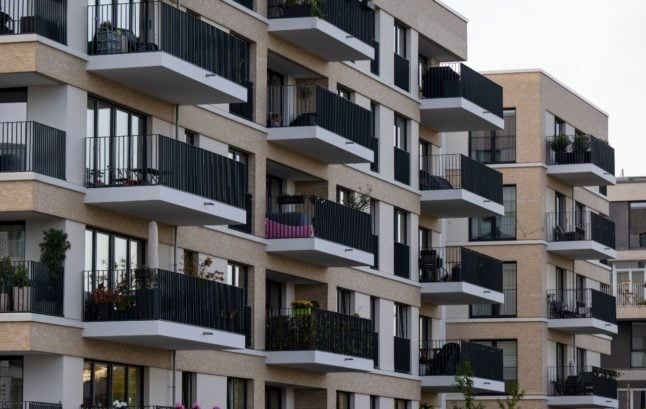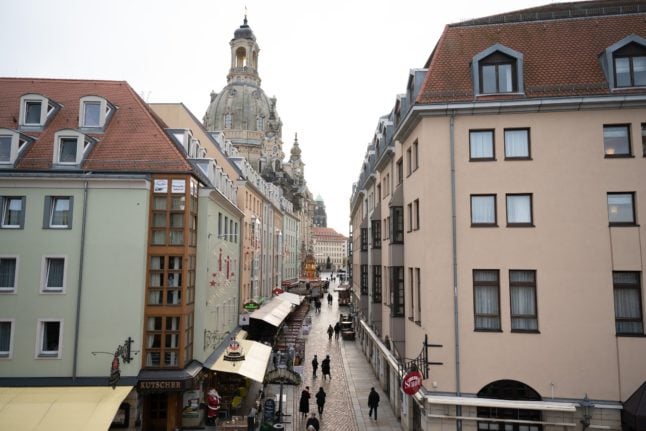Can German homeowners expect high renovation costs under new EU law?
What’s going on?
Unusually warm winters, droughts, forest fires and catastrophic floods – over the past few years, the effects of the climate crisis have become impossible to ignore.
And while Germany surprisingly met its emissions targets in 2022, there’s still one major polluter that’s hindering the Green revolution: the energy sector.
Alongside the transition to climate-friendly renewables like wind and solar energy, a major barrier to battling climate change is poor insulation in the country’s housing stock. An estimated 58 percent of Germany’s residential buildings have proper insulation, but this number varies drastically from state to state – and thin walls and leaky windows can drive up energy usage and costs dramatically.
Advertisement
Enter the EU’s Green Deal, which sets out a whole new set of energy standards for homes.
Just like fridges and other appliances, the EU wants all properties in Europe to be given an energy efficiency rating from ‘A’ to ‘G’ – with G representing the 15 percent of properties in a country that are the least energy efficient.
By 2030, the EU wants all homes to reach an energy efficiency class of E, and by 2033, an efficiency class of D. New builds, meanwhile, will need to be climate neutral. It points out that buildings account for 40 percent of energy usage in Europe and are also responsible for a third of all emissions.
READ ALSO: Ask an expert: Is now a good time to buy property in Germany?
How could this affect German homeowners?
The first thing to note is that Germany currently uses a slightly broader range to categorise how climate-friendly a building is: from A to H, rather than A to G.
That means homeowners in the H, G and F categories could soon need to think about doing some energy-saving renovations, like changing the windows, insulating floors and roofs or swapping gas and oil heating systems for heat pumps or other more climate-friendly options. This is estimated to affect around seven million homes.
Writing on Twitter, CDU MEP Dennis Radtke suggested that costs for some homeowners could quickly enter the six-figure range. “We are talking about costs between €190,000 and €340,000 for a 140-square-metre home,” he said. “We can’t place the costs of the fight against climate change on grandma’s little house.”

Flats in Berlin. Photo: picture alliance/dpa/Deutsche Presse-Agentur GmbH | Monika Skolimowska
However, energy efficiency experts have estimated that costs could be closer to €100,000 per home, and that the renovations will cost €254 billion in Germany alone.
Advertisement
Jakob Grimm, a consultant at the homeowners’ association Haus & Grund, initially expects that most homeowners will simply need to look at improving one aspect of their energy efficiency in order to stay on the right side of the regulations – assuming they aren’t already in the A to E rating. That could mean better windows, newer heating systems or better insulation.
The regulations could also have an impact on property prices – and particularly those of older houses. Kai Warnecke, president of Haus & Grund, believes there could be a dramatic drop in the value of homes that have poor efficiency classes as a result of the new rules.
The EU on the other hand is convinced that climate-friendly renovations will pay off for homeowners in the longer term. That’s also the view of Green Party parliamentarian Jutta Paulus, who points out that energy efficient buildings can save consumers thousands of euros per year.
READ ALSO: Reader question: How do I install a heat pump in my German property?
Advertisement
Can people get financial help?
That’s highly likely. The German government has a number of existing low-interest credit schemes, tax cuts and other financial assistance available for people looking to improve the energy efficiency of their homes.
In some cases, people can receive low-interest loans of up to €150,000 and repayment grants of up to €52,500 for the work carried out. That’s for people undertaking major renovations who live in the least energy efficient homes. People in higher-rated homes, meanwhile, can get a repayment subsidy of up to €37,500 – meaning they don’t have to pay back that part of the loan.

Flats near the Frauenkirche in Dresden. Photo: picture alliance/dpa | Sebastian Kahnert
There are also subsidies available for single measures. Replacing an old gas or oil heating system with an eco-friendly heat pump, for example, can net you up to €24,000 in government grants.
The best way to find out what you may be entitled to is to enlist the help of an energy efficiency expert, who can guide you on what measures will have the most impact on the efficiency of your home and the best ways to pay for them. These aren’t cheap, but if you’re a flat owner in a building with other owners, the costs of the consultation and any work carried out will be split between the members of the home owners’ association.
READ ALSO: Reader question: Should I modernise my heating system in Germany?
What should renters know?
The new regulations are likely to be pretty good news for renters and will hopefully spell the end of draughty flats that are impossible to heat in winter.
That said, there may be one thing that could get more expensive: the government’s CO2 tax. Originally brought in by the Grand Coalition of the CDU/CSU and Social Democrats (SPD), this adds €25 per tonne of CO2 onto emissions-heavy purchases like energy and fuel.
The traffic-light coalition of the Social Democrats (SPD), Greens and Free Democrats (FDP) recently changed the way this is split between renters and landlords. Rather than the full costs being borne by the renter, landlords pay a proportion depending on how energy efficient the property is.
Advertisement
That means people renting poorly insulated flats have to pay a much smaller share, while someone in a super climate-friendly new-build would pay the lion’s share.
If your landlord does renovate the building, you may see your rent increase and also have to shoulder more of the CO2 tax. On the flip side, your energy costs should be much lower over time.
READ ALSO: What to know about mortgages and fees when buying property in Germany
What happens next?
On Tuesday, the Green Deal was voted through by the EU parliament – and now it’s up to member states to pass the laws in their own countries.
That means Economics Minister Robert Habeck (Greens), who’s responsible for the energy brief, will have to draft a law that brings the new regulations into force.

Economic and Climate Minister Robert Habeck. Photo: picture alliance/dpa | Fabian Sommer
This will give us greater clarity on a number of issues, like what happens if homeowners don’t renovate their properties in time. Habeck could also decide to shake up some of the subsidies for energy efficiency measures and even offer more help to struggling property owners – provided he can convince the liberal-led Finance Ministry to loosen its purse strings yet again.
Useful vocab
Energy efficiency rating – (die) Energieeffizienzklasse
Renovation – (die) Sanierung
Harmful to the climate – klimaschädlich
Grant – (der) Zuschuss
We’re aiming to help our readers improve their German by translating vocabulary from some of our news stories. Did you find this article useful? Let us know.
